Subscribe now and get the latest podcast releases delivered straight to your inbox.
The Benefits of Hiring a Business Coach (Especially for Reluctant Leaders)

By Zach Basner
Aug 2, 2023

Business leaders are good at getting stuff done — even if that means rolling up their sleeves and doing it themselves.
I've worked with hundreds of small business owners and leaders and I've seen it time and time again.
If there’s a project around at work or at home that needs to get done, their first instinct is to dissect the problem, create a plan, and execute it on their own.
And honestly, it's a character trait that doesn't go away when they leave the office.
Those same leaders welcome DIY projects at home, jumping into DIY projects with the same excitement.
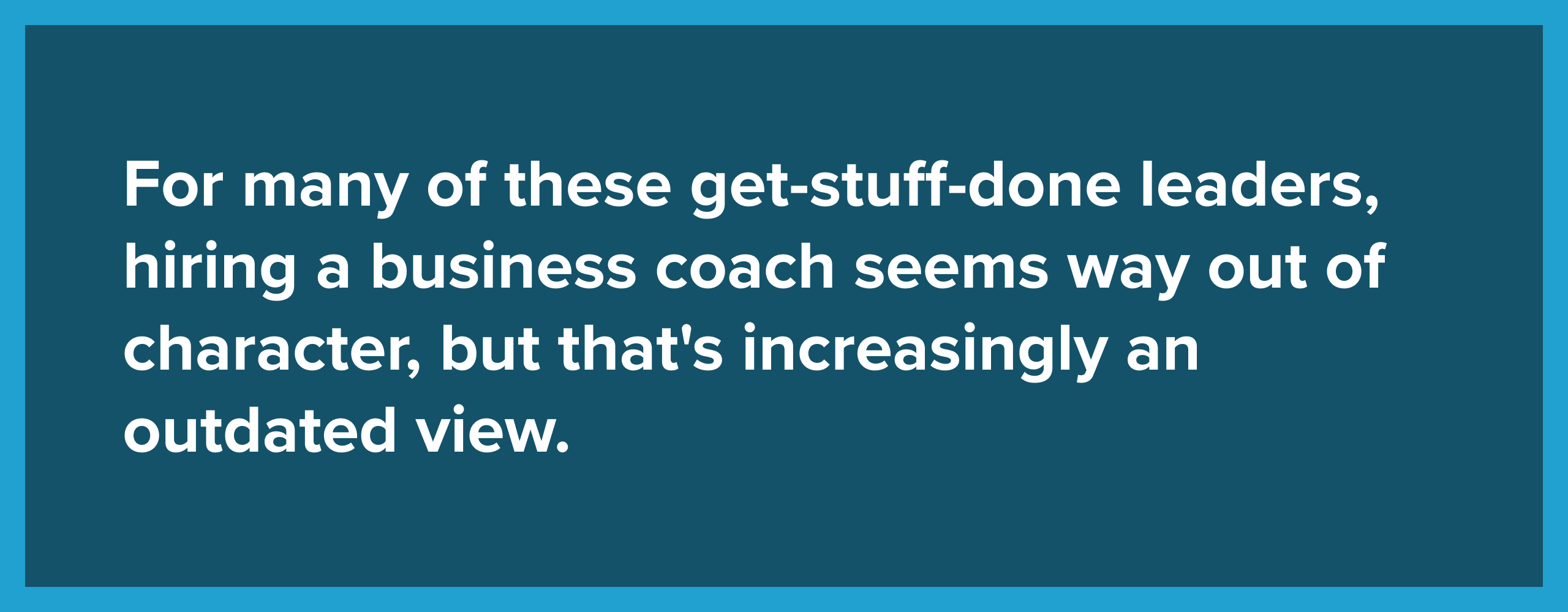
For many of these get-stuff-done leaders, hiring a business coach seems way out of character, but that's increasingly an outdated view.
Numerous studies show that coaching is quickest way for leaders — and entire companies — to increase productivity, improve communication, and align their teams.
Even the DIY-type company leader can see outsized returns from a coaching investment.
First, let's clear the air about coaching
For too long, we've held the belief that the CEO is supposed to be a solitary genius with a bottomless work ethic.
And when we read business books, we encounter stories of leadership and assume they did it with a stern focus and a singular vision.
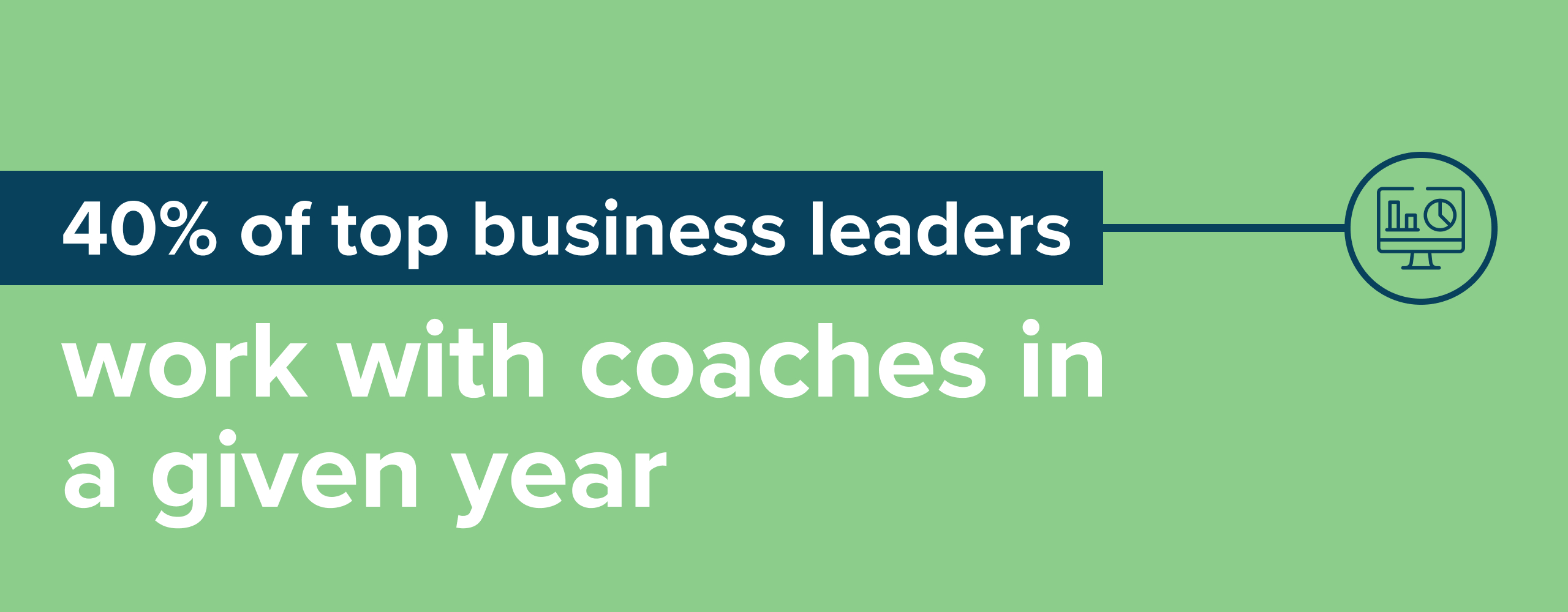
But deep down we know that no leaders accomplish anything on their own. They hire great people who bring energy and debate to leadership meetings.
And they hire coaches.
The fact is, about 40% of top business leaders work with coaches in a given year — and that number is steadily growing.
Steve Jobs, for example, worked with acclaimed coach John Mattone. According to Mattone, Jobs was intensely focused on his own limitations, and he used coaching sessions to help him improve his leadership style.
Jobs knew that success at Apple depended on assembling a great team of brilliant, driven, outspoken leaders.
And he knew that he himself was a flawed individual.
When we look to Jobs (or others) for inspiration, we shouldn’t just think of him as a brilliant leader (which he was), but also as someone who:
- Knew that he needed input from his team to be successful
- Knew that his own abilities were limited
- Knew that outside guidance could help him reach his potential
A coach is the key to unlocking your highest performance.
What coaching is
The word “coach” has a strange connotation and doesn’t exactly have a clear definition in the business world. It’s probably been years — maybe decades — since you actually referred to someone as a coach.
So, how do we bridge the gap between a coach we had from childhood to a coach we have as a successful adult?
It begins with a question I almost always ask clients on our initial kickoff call:
“Can you remember your favorite coach or teacher from growing up? Someone that had a special and unique impact on your life? How would you describe that person, and what was it about them that made them so influential to you?”
Some coaches might have been more demanding; others were more compassionate.
While the style might vary, one thing I hear the same thing from client after client:
- “They pushed me to succeed.”
- “They held me accountable.”
- “They provided guidance.”
Despite the fact these relationships were formed when people were much younger (20 to 30 years ago in some cases), people continue to hold these coaches and teachers in such high regard that it still evokes powerful emotions when they recall those relationships with me.
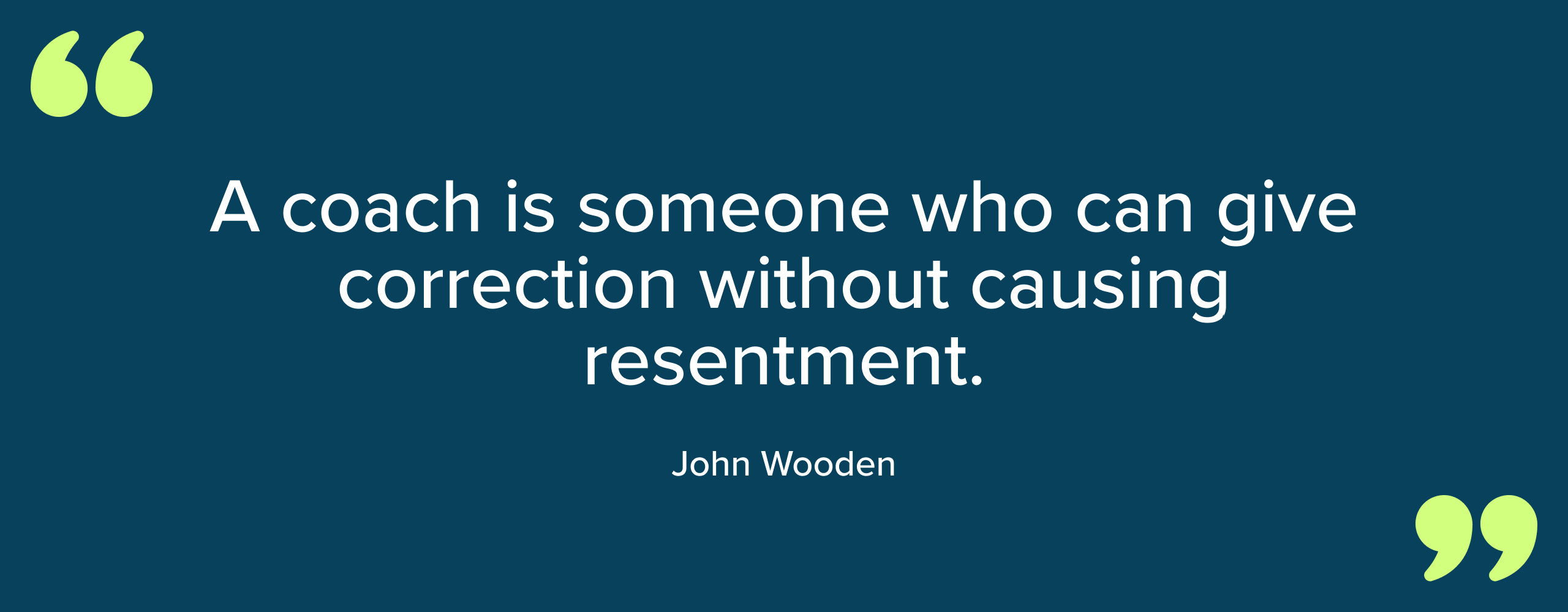
... and what it isn't
A coach is not a consultant.
I think the word "consultant" has a pretty negative connotation in the business world, and I can see why.
I know there are plenty who use the terms interchangeably — and I agree that there can be overlap — but I like my colleague Chris Marr's comparison to point out the differences:
- The consultant expresses opinions and advice
The coach holds back on opinions and advice - The consultant does all the thinking
The coach helps the client do the thinking - The consultant solves a specific problem
The coach asks if we’re solving the right problem - The consultant has a limited scope
The coach has an unlimited scope - The consultant solves the business problem
The coach enables people to solve the problem - The consultant gives the solutions
The coach helps the client discover the solutions
In other words, the coach is the guide who helps the client see the right steps to take, not the oracle who tells the client what to do.
The coaching process is collaborative and focused on growth, not just solutions.
So, what real value is coaching going to bring?
As I think about the change IMPACT coaches bring to their clients, I see two different buckets: strategic and forward-looking (“big picture"), as well as operations and activity-driven ("tactics").
Big picture outcomes from coaching
We coach clients with honesty, empathy, and when it calls for it, hard truth.
We’ve seen companies succeed and significantly increase their revenue with our guidance, but we’ve also seen companies fail. And we know the red flags to look for that are telltale signs of complacency and resistance.
The big-picture outcomes we see from our coaching are:
- Improved communication
- Better team alignment
- Awareness of blindspots
- Effective goal setting
- Increased accountability
- Unified company culture
- An "all in this together" mindset
These results manifest when organizations are willing to do the work, be honest, and have the conversations that prompt real progress and transformation.
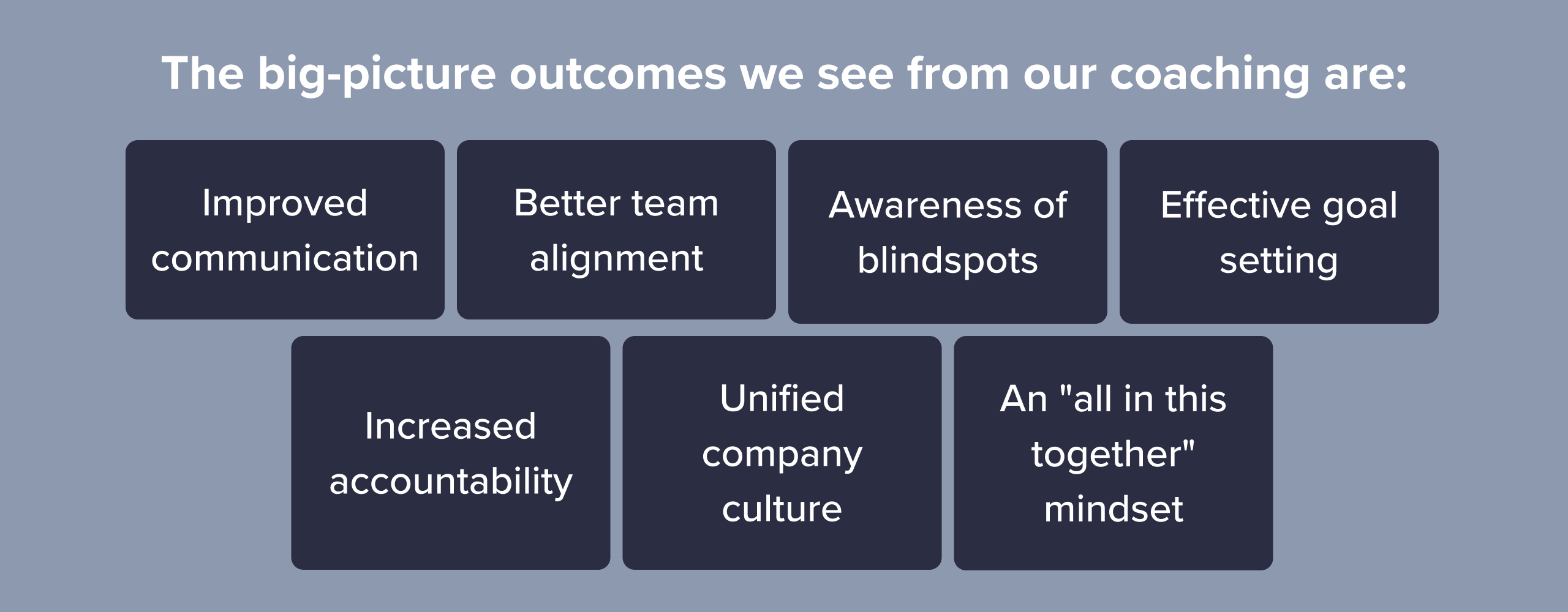
A good coach will get you there, but only if you're willing to be guided.
Tactical outcomes from coaching
At IMPACT, we start with a planning session that will include your sales, marketing, and leadership teams. It will be a long initial meeting (typically between two to four hours) focused on identifying three critical objectives:
- Where do you want to go? (vision for the next 18 to 24 months)
- Where are you now? (scoring your company across 10 critical digital sales and marketing categories)
- Where do you want to start? (priorities for the first 90 days)
These three objectives will build out your roadmap, which we use as our resource guide during our bi-weekly coaching sessions.
We identify who will take ownership of each priority, what assignments will help you reach those goals faster, and track progress and metrics along the way.
We conduct a version of this planning session with your team every quarter to make sure we’re setting and hitting targets in categories such as content creation, data-driven understanding of your buyers, company alignment and training, and much more.
What does the future look like without coaching?
Here comes some of that hard truth: Whatever you're hoping to achieve will take you much longer without a coach. You may get there. You may not. But progress will be slower without a coach's guidance.
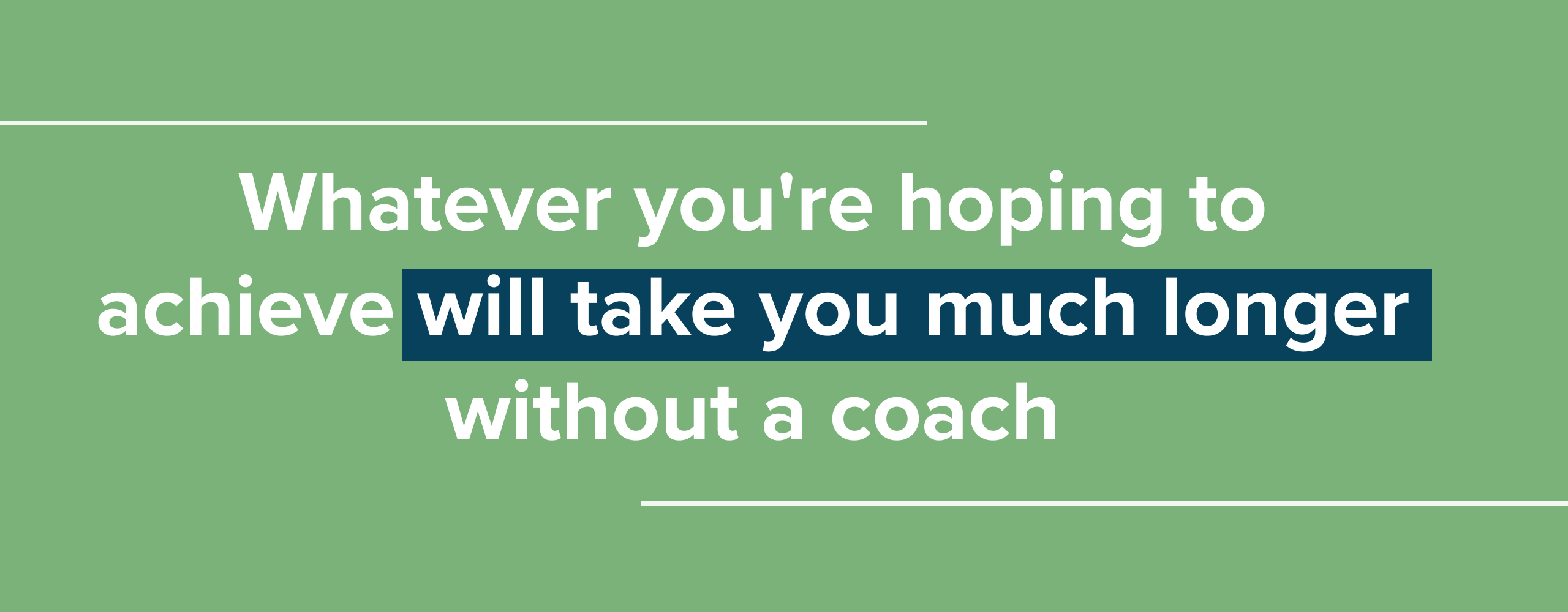
Statisically, nearly three-quarters of all businesses that hire coaches report an increase in productivity.
Whatever you're about to undertake, whatever changes you're looking to implement, if you don’t have a coach holding you accountable, pushing you to achieve your goals, organizie your priorities, and keep you on track, what will happen to that excitement and team alignment in a few months?
Without a coach, six months from now, your shiny new initiative will be seen by your team as “that thing we did a few months ago.”
The meetings will get stale, your teams will find themselves getting pulled back into other things, and the whole thing will fizzle.
Is coaching right for you?
Hiring a coach is a big decision for you and your business and you shouldn’t take it lightly.
However, you need to move past the outdated assumption that company leaders have all the answers and are comfortable setting the course.
A coach can be the sounding board, guide, and mentor you're looking for to elevate and achieve in ways you haven't in the past.


Order Your Copy of Marcus Sheridan's New Book — Endless Customers!